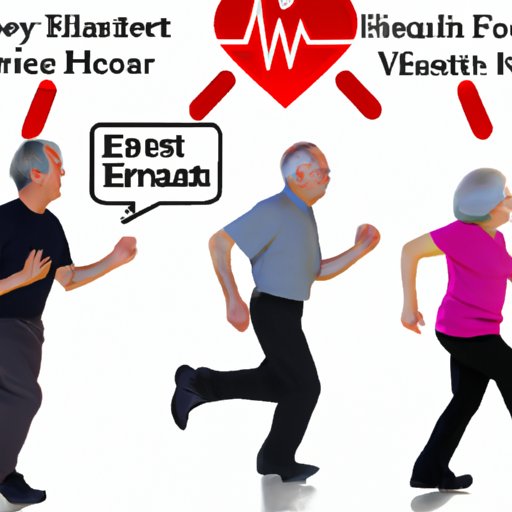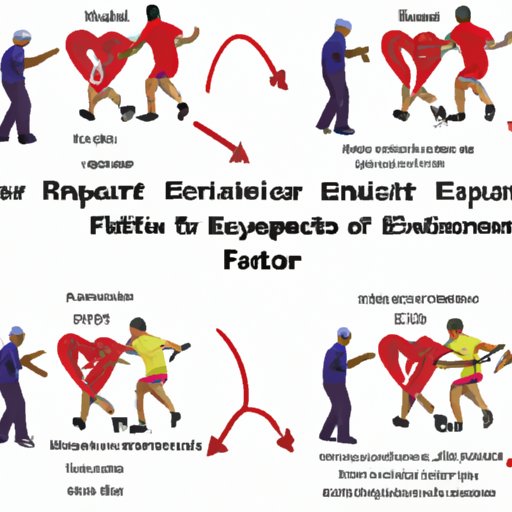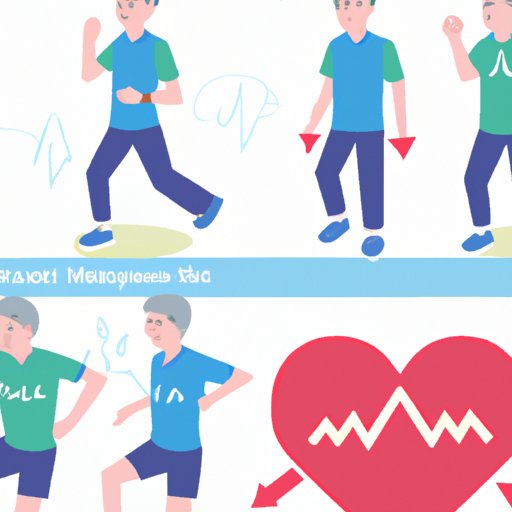Introduction
Heart failure is a serious medical condition that occurs when the heart is unable to pump blood efficiently throughout the body. It can lead to a variety of symptoms, including fatigue, shortness of breath, and swollen legs. While there is no cure for heart failure, it can be managed with lifestyle changes and medications. One treatment option that has been gaining attention is exercise, as research has suggested that physical activity may have the power to reverse the effects of heart failure.
Examining the Role of Exercise in Reversing Heart Failure
The benefits of exercise are well-documented and include improved cardiovascular health, better mental health, and lower risk of many chronic diseases. For people with heart failure, exercise can provide numerous positive benefits. Regular physical activity can help strengthen the heart muscle and improve its ability to pump blood. It can also promote better circulation, which helps to deliver essential nutrients and oxygen to cells throughout the body. In addition, exercise can reduce inflammation, improve cholesterol levels, and support healthy weight management.
While exercise can offer numerous benefits for people with heart failure, it is important to note that there are potential risks associated with physical activity. People with heart failure should talk to their doctor before beginning an exercise program to ensure that they are physically able to engage in the activities. Additionally, it is important that individuals monitor their symptoms and stop exercising if they become too tired or experience chest pain, shortness of breath, or palpitations.

Exploring the Benefits of Exercise for People with Heart Failure
One of the primary benefits of exercise for people with heart failure is improved cardiac function. In a study published in the journal Circulation, researchers found that aerobic exercise was associated with improved left ventricular ejection fraction (LVEF), which is a measure of the heart’s pumping capacity. After three months of regular exercise, participants in the study had significantly higher LVEF values than those who did not exercise.
In addition to improving cardiac function, exercise can also enhance quality of life for people with heart failure. Studies have shown that physical activity can reduce fatigue and improve physical functioning, resulting in an overall better sense of well-being. Exercise can also help to reduce anxiety and depression, two common issues among people living with heart failure.

Understanding the Impact of Exercise on Heart Failure Patients
Regular physical activity can also have a direct impact on the symptoms of heart failure. Exercise has been shown to reduce the severity of shortness of breath, improve energy levels, and reduce swelling of the legs. Additionally, studies have indicated that exercise can lead to improved prognosis for people with heart failure. In a study published in the journal Circulation, researchers found that regular physical activity was associated with a reduced risk of death in patients with heart failure.

Investigating the Effectiveness of Exercise in Treating Heart Failure
Research has shown that exercise can be beneficial for people with heart failure, but the exact amount and type of activity recommended is still being debated. The American Heart Association recommends at least 30 minutes of moderate-intensity aerobic activity five days a week for people with heart failure, while the European Society of Cardiology recommends at least 150 minutes of moderate-intensity physical activity each week. However, some medical professionals suggest that people with heart failure should begin with shorter periods of exercise and gradually increase the duration and intensity over time.
Assessing the Power of Exercise for Prevention and Reversal of Heart Failure
In addition to treating existing heart failure, exercise can also play an important role in preventing the condition. Regular physical activity can help to reduce risk factors such as high blood pressure, obesity, and diabetes. Additionally, exercise can help people maintain a healthy weight, which can reduce strain on the heart. To reduce the risk of developing heart failure, the American Heart Association recommends at least 150 minutes of moderate-intensity aerobic activity each week.
The importance of regular exercise cannot be understated when it comes to preventing and reversing the effects of heart failure. A study published in the Journal of the American College of Cardiology found that physical activity was associated with improved survival and decreased hospitalizations in people with heart failure. Additionally, the study found that even small increases in physical activity were associated with significant improvements in mortality.
Analyzing the Research: Can Exercise Reverse Heart Failure?
The evidence suggests that exercise can play an important role in both the prevention and reversal of heart failure. A meta-analysis published in the Journal of the American College of Cardiology found that physical activity was associated with a reduced risk of death and hospitalization in people with heart failure. Additionally, the study showed that exercise was associated with improved quality of life and reduced symptoms.
However, it is important to note that the existing research is limited. Most studies have looked at the effects of exercise on people with mild to moderate heart failure, so the findings may not be applicable to those with more severe forms of the condition. Additionally, many of the studies have only tracked participants for a few months, so the long-term effects of exercise on heart failure are still unknown.
Examining the Link Between Exercise and Recovery from Heart Failure
Despite the limitations of existing research, there is evidence to suggest that exercise can play an important role in recovery from heart failure. Exercise can help to reduce symptoms, improve quality of life, and even reverse the effects of the condition. Additionally, regular physical activity can help to reduce risk factors and prevent the development of heart failure.
When engaging in physical activity, it is important to listen to your body and take breaks when needed. Additionally, people with heart failure should talk to their doctor before starting an exercise program to ensure that they are physically able to participate in the activities. With guidance from a healthcare professional, individuals can create an exercise plan that will help them reach their goals.
Conclusion
Heart failure is a serious medical condition that can have a major impact on quality of life. While there is no cure for the condition, exercise can offer numerous benefits for people with heart failure. Studies have shown that physical activity can improve cardiac function, reduce symptoms, and even reverse the effects of the condition. Additionally, exercise can help to reduce risk factors and prevent the development of heart failure.
For those living with heart failure, the power of exercise should not be underestimated. With guidance from a healthcare professional, individuals can create an exercise plan that will help them reach their goals and improve their overall health. Exercise can have a major impact on recovery from heart failure, and it is an important tool for prevention and reversal of the condition.
(Note: Is this article not meeting your expectations? Do you have knowledge or insights to share? Unlock new opportunities and expand your reach by joining our authors team. Click Registration to join us and share your expertise with our readers.)
